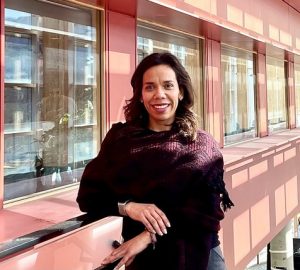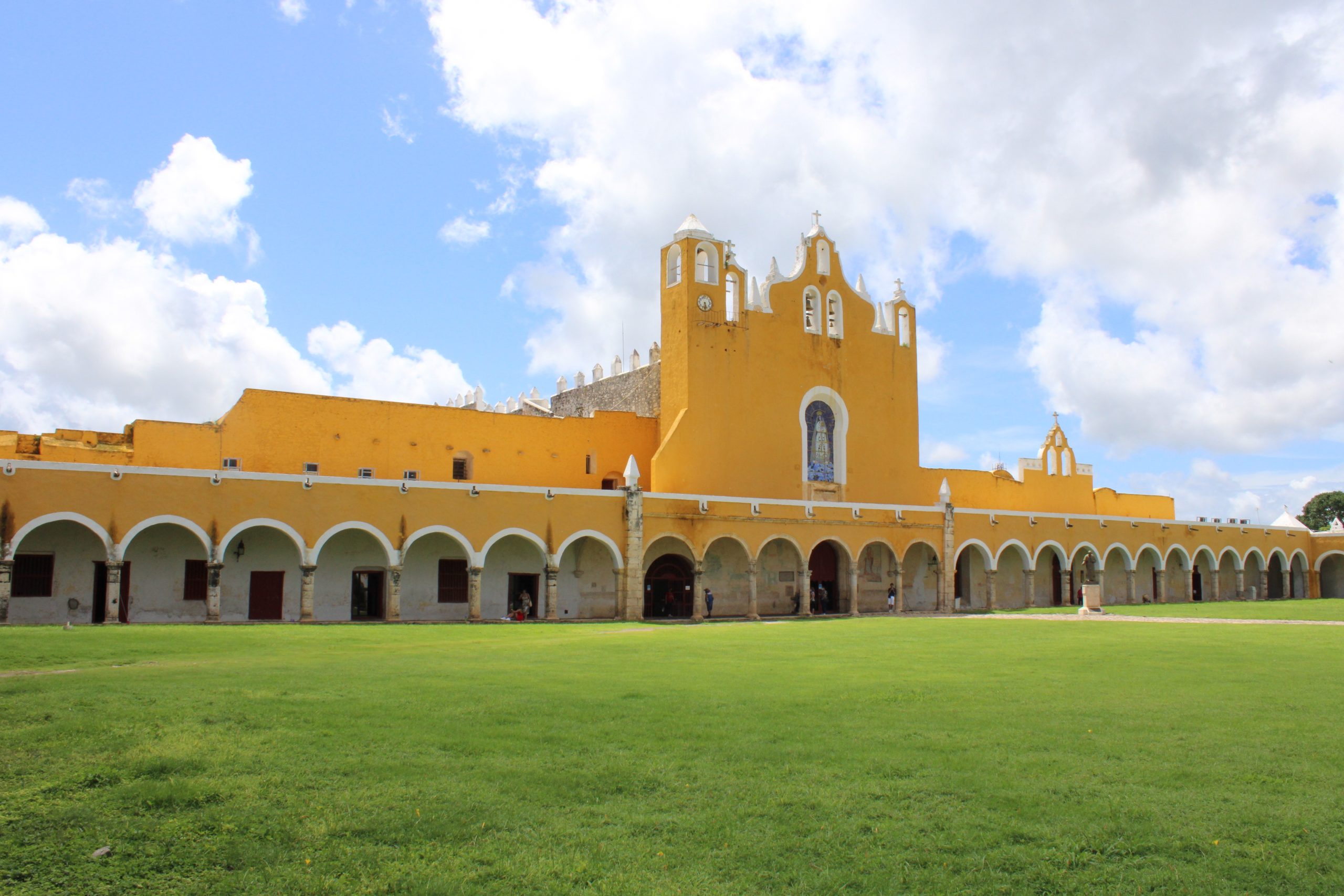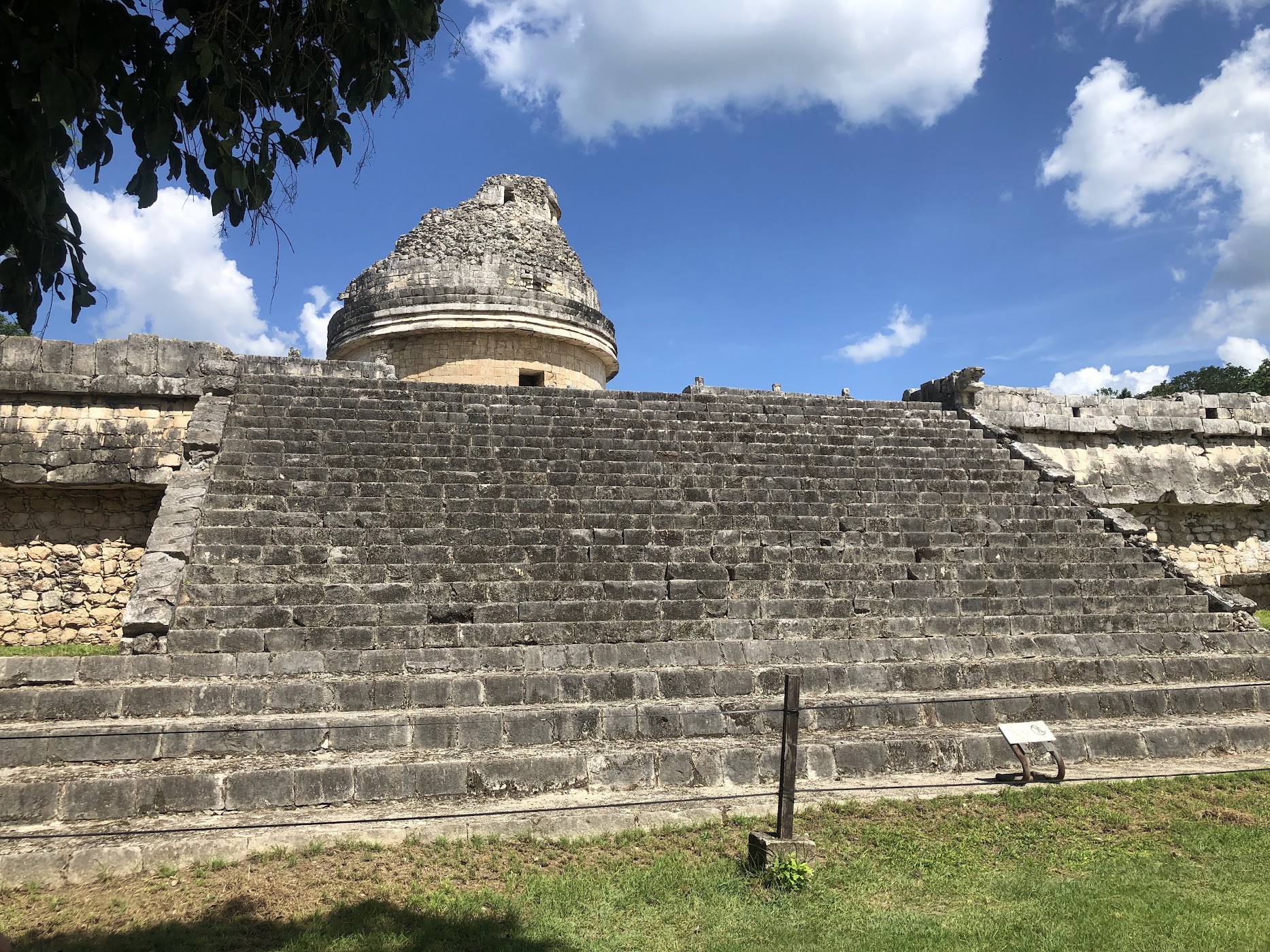Mexico: Protecting traditional language, knowledge, and territory
Overview
| Location | Izamal, Mexico (Yucatan Peninsula) |
| Arrival Date | Sat, Aug 2, 2025 |
| Teaching Dates | August 3-22, 2025 |
| 3 Credits | WRLD 399P or SPAN 380* |
| Eligibility | Open to all students |
| Approximate Program Fee | $3000-$3500 |
Application
This program is now closed for applications.
Deadline: January 21, 2025
Program Information
ABOUT THE PROGRAM
The program seeks to promote the Mayan language and culture through a global seminar with a student-centered community approach. The participating institutions have joined forces to offer students an immersive experience of the Mayan language and culture. It is important to emphasize the community approach that is given to this class – students must appreciate the importance of “community” and be sensitive to the reception and knowledge that is being provided. At the end of this class the student will be able to:
- Write simple phrases in Maya
- Understand the effectiveness of Indigenous worldviews, perspectives, and forms of knowledge as the basis for fostering the language, culture, and relationship of Indigenous Peoples with the environment.
- Perform basic social functions, such as:
- Say hello and goodbye
- Introduce oneself
- Talk about emotions, health, and illness
- Discuss the intercultural communication between Indigenous and hegemonic populations.
This program advances UBC’s strategic plan as it fosters global citizenship, a more sustainable and just society, and makes room for the creation of new alliances in areas important to Indigenous peoples such as language, culture, and territory reclamation. Taking into account the local, students will be able to learn about global struggles shared by Indigenous communities, as they learn about emotional and physical health, and the importance of territory.
The students will be housed in Izamal, Yucatan, and classes will take place at the CECIDHY headquarters. The Center offers teaching services of the Mayan language, as well as the creation of programs that help to disseminate and strengthen the heritage and identity of the Mayan peoples. The Center carries out research and training activities in the areas of competence and dissemination of knowledge among the general public, privileging children, young people, and teachers. Students will also visit Chichen Itza, Wonder of the World, Puc Route, Uxmal, the San Jose Oriente a 100% Mayan speaking community (where students will put their language skills to use), and Playa Lagartos/ Las Coloradas are also contemplated. Guest lectures in Mayan Culture, language, and territories and the national world from Mayan scholars are also included. Additionally, students will learn about traditional Mayan cuisine as they will have the opportunity to make their own “Pib,” while learning about the importance of this traditional dish.
ELIGIBILITY AND PREREQUISITeS
- Interest in learning aspects of Mayan culture, including the sustainability of the Mayan language and culture. Background in the Spanish language is not required for this program.
COURSEWORK
WLRD 399P (3) – Mayan Languages or SPAN 380 (3)
This program is cross-listed in World and Spanish, so students can choose which course to take based on what works best for their degree. Those registered in the SPAN course will be required to complete their assignments in Spanish.
Timeline
Teaching Dates: Aug 3-22, 2025
Arrival: Sunday, Aug 2, 2025
WEEK 1
The course begins in Cancun with a one day (Aug 3) conference. Following, the group will relocate to the town of Izamal and a visit to an archaeological site. During the first week students will receive an introduction to Mayan language and culture. Dr. Miguel Vera Lima will teach the class about historical aspects of Izamal. Some of the main cultural points to be discussed during this week are: the importance of the milpa, the meaning of maize for the Mayan peoples, the cardinal points, and numerology.
Week 2
With the intention of practicing the language and understanding the culture, embroidery, and gastronomy, during week two the class will be visiting the community of San José Oriente. Additionally, this week covers other important aspects of culture; for example, the worldview, relationship with nature and the natural world, the importance of territory / water and defense of water. Dr. Aurelio Sanchez will be visiting the class to provide a wider explanation of the Mayan houses –their architecture and important elements.
Week 3
During our last week, students will be able to talk about emotions, health and illness, and the vision of life and death. They will learn to prepare pib, one of the traditional dishes of the Mayan culture and recognize its relationship with death. Dr. Lázaro Utz will visit the class to resolve doubts and concerns about this subject. Tentatively, Dr. Marcelina Chan Canché will also visit the class.
Program Fees
Program fees: $3,000-$3,500. The final program fee depends on the number of students in the program.
| Included in program fee | Not included in program fee |
|
|
AWARDs
Every student accepted into this program will receive a $1,000 Global Seminar Award. Indigenous students will receive an additional $1000 Award to help offset the costs.
All awards will be distributed to students in Summer 2025.
Program Director Bio
 Dr. Monica Good was born in the state of Coahuila, Mexico. Her dissertation and research focus on the linguistic rights of Indigenous Peoples, especially emphasizing access to justice. Since 2017, she has collaborated with CEPIADET, an indigenous-based organization located in Oaxaca, Mexico, that provides legal guidance and interpretation services to Indigenous defendants. Through this collaboration, she has been able to access Zapotec, Mixtec, and Mazatec communities in Oaxaca. More recently, Monica works with Yucatecan linguists on reclaiming, teaching, and learning the Mayan language and culture, as well as documenting resistance movements, colonization, and dispossession of land in the Yucatan Peninsula. For this Global Seminar, a working relationship has been established with Dr. Fidencio Briceño Chel and the working group of the State Center for Training, Research, and Humanistic Dissemination of Yucatan (CECIDHY per its acronym in Spanish).
Dr. Monica Good was born in the state of Coahuila, Mexico. Her dissertation and research focus on the linguistic rights of Indigenous Peoples, especially emphasizing access to justice. Since 2017, she has collaborated with CEPIADET, an indigenous-based organization located in Oaxaca, Mexico, that provides legal guidance and interpretation services to Indigenous defendants. Through this collaboration, she has been able to access Zapotec, Mixtec, and Mazatec communities in Oaxaca. More recently, Monica works with Yucatecan linguists on reclaiming, teaching, and learning the Mayan language and culture, as well as documenting resistance movements, colonization, and dispossession of land in the Yucatan Peninsula. For this Global Seminar, a working relationship has been established with Dr. Fidencio Briceño Chel and the working group of the State Center for Training, Research, and Humanistic Dissemination of Yucatan (CECIDHY per its acronym in Spanish).
 Dr. Briceño Chel is a native speaker of Maayat’aan (Yucatecan Maya) and a researcher at the National Institute of Anthropology and History (INAH). He also directs the project “Documentation, strengthening and dissemination of the peninsular Yucatecan Maya”, as well as being the director of the CECIDHY. He was coordinator of the project to carry out the Writing Standards for the Mayan Language of the Yucatan Peninsula and the National Catalog of Indigenous Languages published in 2008. He has collaborated in the development of materials for teaching in the Mayan language in the Yucatan Peninsula. He collaborated in the National Bilingual Education Program in Guatemala, and for more than twenty years he has been academic director of the summer Mayan Language Teaching Program for the Latin American and Caribbean Studies Consortium that includes 22 universities in the United States and two in Canada.
Dr. Briceño Chel is a native speaker of Maayat’aan (Yucatecan Maya) and a researcher at the National Institute of Anthropology and History (INAH). He also directs the project “Documentation, strengthening and dissemination of the peninsular Yucatecan Maya”, as well as being the director of the CECIDHY. He was coordinator of the project to carry out the Writing Standards for the Mayan Language of the Yucatan Peninsula and the National Catalog of Indigenous Languages published in 2008. He has collaborated in the development of materials for teaching in the Mayan language in the Yucatan Peninsula. He collaborated in the National Bilingual Education Program in Guatemala, and for more than twenty years he has been academic director of the summer Mayan Language Teaching Program for the Latin American and Caribbean Studies Consortium that includes 22 universities in the United States and two in Canada.


